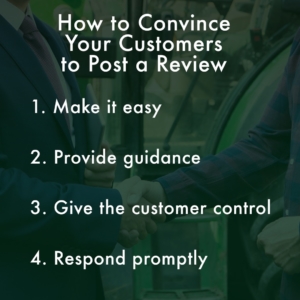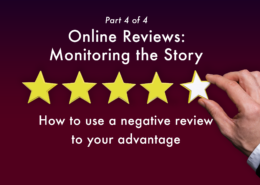Online reviews. They are the modern-day word-of-mouth, with 93% of buyers looking to online customer feedback before buying and 72% valuing online reviews over inputs from their own friends and families.
But those reviews don’t tell the whole story. In fact, only 6% of customers write a review, and it turns out that a dissatisfied person will tell their tale to 10 more people than a satisfied one—an impact that’s only amplified by the megaphone provided by the Internet. So, how do you hand that megaphone to the happy customers?
Four Ways to Encourage Online Reviews
1. Make it easy!
The first step is simply to make it easy for customers, starting with providing ample opportunity to give feedback. A verbal invitation at time of purchase is forgotten the moment the transaction ends, but a QR code on signage, plus a printed card with the receipt or in the mail, plus a series of scheduled follow-up texts and emails make it easy for your customers to remember to provide their thoughts and gives them multiple formats in which to do so.
 In your communications, embrace simplicity. A simple, to-the-point request is more likely to generate a response than a lengthy missive..
In your communications, embrace simplicity. A simple, to-the-point request is more likely to generate a response than a lengthy missive..
Finally, always give your customers the chance to contact you directly to ask questions or resolve issues.
2. Provide Guidance
Throughout the process, customers should know what they are getting into and be able to follow a clear path. The initial request should include an obvious next step, whether that is a link to a landing page or a clear link to a specific review site. It should be a prominent feature in your message and include an appropriate description so they know where they are headed.
If you send them to a landing page, it also should be simple and attractive with obvious actions to take, such as rating stars or “Next” buttons to click. If they are leaving your site to go to a third party, let them know this too..
Customers should also clearly understand how you plan to use any information they provide to you; if you’re not going to spam them, now is a good time for reassurance! Other things to establish straightaway are if they can submit a review at any time and if they can save their progress to come back later.
3. Give the Customer Control of the Conversation
In addition to setting things up in a way that encourages customers to leave a review, it’s important that they have autonomy throughout. If they feel boxed in or certain steps are burdensome, they are likely to just give up.
Letting your customers decide how much contact information they want to divulge is key. Anonymous entries are more comfortable, plus if they are clicking through a link in an email you sent, you will know who they are anyway. In other words, allow reviewers to share contact info, but don’t require it.
Front-load with the most important questions, such as a “five-star rating” or overall satisfaction ranking to capture at least a top-level input and always provide space for them to contact you directly separate from the review process. Customers should never have to hunt down how to contact you via forms, email, or telephone.
4. Respond Promptly
Finally, let your customers know that you hear them. All submitted reviews should be met with an immediate response thanking the reviewer for their time and inputs. Try to note at least one specific item from their review in your response to emphasize that you are truly engaged with your customer’s personal experience. Most importantly, you should assure them that any concerns raised will be addressed, and provide as much detail as possible on how issues will be resolved. Internally, this should include a designated responder who coordinates response with affected internal departments and a clear and intentional followup plan.
In addition, a company representative should reply directly to the reviewer via email whenever possible, thanking them for their inputs, answering any questions, and providing info for additional follow-up.
In the end, it’s about connection
Even knowing the potential of a great review, it’s essential to see reviews as a way to engage with your customers. With this foundation, your outreach will be authentic and valuable, serving to both retain current customers and reach new ones.
 Soliciting, keeping track of, and responding to all of these inputs can be a daunting task that needs a lot of internal resources. Luckily, tools like SATISFYD can help make sure your reviews program is a great customer connection and response tool, in addition to being great for marketing.
Soliciting, keeping track of, and responding to all of these inputs can be a daunting task that needs a lot of internal resources. Luckily, tools like SATISFYD can help make sure your reviews program is a great customer connection and response tool, in addition to being great for marketing.
SATISFYD Recommendation: When selecting a tool, be sure you can upload customer data and that it has the ability to help you craft outreach messages, landing pages, and responses. It’s also important that you like the way it collects, presents, and analyzes the results on your behalf so you get the most out of it. A final note is to look for a tool that contains a promotions pipeline to make it easy to share your positive reviews!







